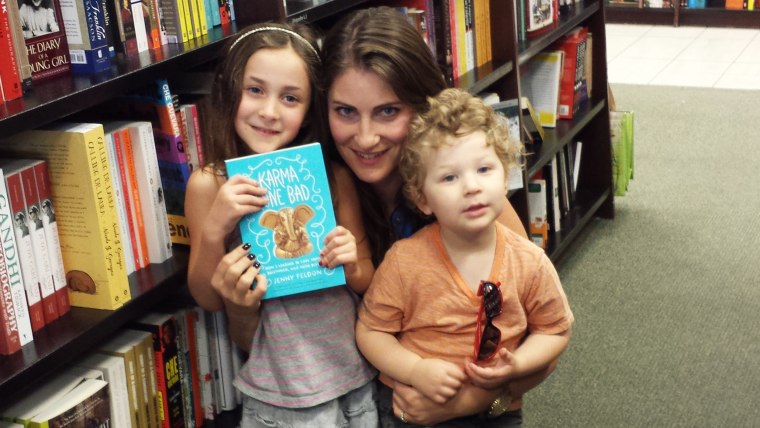
Like it or not, little girls are super bossy. So are little boys.
While Facebook chief operating officer Sheryl Sandberg has launched the “ban bossy” campaign in an effort to empower little girls and combat gender stereotypes, experts say “bossiness” is a natural phase for many children as they develop communication skills and test boundaries. Parents know bossy kids are no fun to be around, and teachers combat bossiness in the classroom every day — regardless of gender.
The catch: research suggests there are general differences between the two sexes when it comes to early language development — and the conversational style little girls tend to exhibit may appear “bossier.”
Early on, girls typically use language to collaborate with peers and to solve problems during play before boys do. Picture the 3-year old with her hands on her hips I recently witnessed at the playground, commanding, “There is no Ariel! We’re playing 'Frozen'!”
Boys, on the other hand, tend to engage in less thematic, cooperative kinds of play, which can look a little more chaotic to the adult eye, but also less controlling or authoritarian.
Day-to-day, however, most parents find their male and female preschoolers equally demanding.
Jenny Feldon, author of the memoir “Karma Gone Bad” and Los Angeles mother of Eva, 5 and Noah, 3, says both of her kids have gone through “bossy stages.” It never occurred to her that it was a “girl thing,” just a “kid thing.” She describes an incident last week where her son, struggling to keep up with his big sister in the game Hungry Hungry Hippo, demanded that Eva “wait” so his hippo could get a head start. Later that day, the bossy tables turned. Building block castles together, Eva informed Noah that he could only build one specific kind of tower.
Blogger Maggie Jones of Waterville, Wash., describes her children, Angus, 4 and Isla, 2 1/2, as “aggressive go-getters.”
In fact, people probably consider her son bossy, Jones says. Anytime Angus is with other kids, he decides what games are on the agenda and how they are going to be played, in pretty fine detail. “I created two really assertive kids,” says Jones. “They both know what they want, and with that there are these amazing qualities, but those qualities can turn a little sour as well.”
Bossiness can also be a symptom of birth order.
When Yapp CEO Maria Seidman asked her 6-year-old if he is bossy sometimes, he told Seidman it's his job to “boss” his younger sister, 20 months, because he’s older. Seidman’s son describes a particular boy as being the bossiest kid in his class — but when it comes to a playground game called “family,” he explained, anyone who plays the role of “mom" is the boss. (Note Sheryl Sandberg: he didn’t say bossy).
“What we think of as bossiness is really just a natural part of childhood,” says Marsha McGuire, a Cadillac, Mich., kindergarten teacher. Speaking of her students: “They all want to be in charge. They all want to be first. They all want to be recognized at this age.”
McGuire says teachers should give each student an opportunity to be both a leader and a follower in the classroom. McGuire makes sure every student has the opportunity to be “in charge” of certain tasks some days, to be a classroom helper, and to “be on vacation” (from classroom chores or leadership roles) on other days.
Research backs up the perception that girls develop certain verbal skills faster than boys, says Julie Masterson, Ph.D., co-author of “Beyond Baby Talk: From Speaking To Spelling, A Guide to Language and Literacy Development for Parents and Caregivers” ” and speech-language pathology specialist at Missouri State University. But she cautions that the similarities between boys and girls far outweigh the language development differences.
As for bossy, in the early years, Masterson explains, girls can be more likely to use “collaborative language” and engage in “thematic play,” which often involves “giving direction.” Though, she reminds educators, caregivers, and parents of both girls and boys that language is “an efficient and desirable vehicle for children to learn to assert themselves.”
In other words, that “bossiness” at the playground or home with siblings is all a healthy, productive part of childhood — for little girls and little boys.
Jacoba Urist is a health and lifestyle reporter in NYC. Follow her on Twitter @JacobaUrist.
